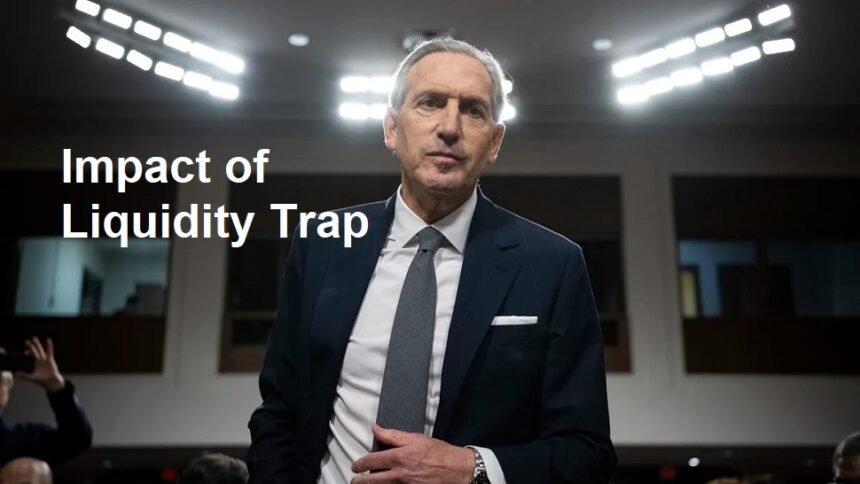A liquidity trap refers to a situation in the economy when market players prefer to save and hold their money rather than spend it for consumption, business or investment, even when interest rates are low. Under normal conditions, when interest rates are low, generally households, companies, especially investors, tend not to be willing to save a lot of money in banks, because the interest returns they receive are low. Households will shop a lot, companies will spend money for business expansion, while investors will spend money to be placed in investments that can provide returns higher than bank interest.
It was John Maynard Keynes who first put forward the term liquidity trap, as the interest rate paradox, where he saw that this condition was very likely to occur when interest rates were set very low (ultra low interest rate) as applied in Japan where interest rates are at below 0%, where market players think that low interest rates will end soon, then rise, and they wait for that to happen, so they continue to leave their money in the bank. If when interest rates are low they place their money to invest in investment instruments such as bonds, shares or other securities, when interest rates are actually raised, even though yields rise, this will actually make the price of the investment instrument fall, so it is not very attractive to do so. .
A situation like this is certainly a problem in the economy, especially when the government is intensively pursuing economic growth. The central bank’s reduction in interest rates is intended so that money can be forced out of banks and distributed to the market so that it can boost the economy, especially when the economic situation is in a slump and deadlock. With market players tending to be a bit afraid and anxious, preferring to hoard their money rather than pour it into the market, the expected economic recovery will be difficult to achieve, and when a situation like this is allowed to drag on, it is not impossible that the economic downturn will turn into a crisis. economy which will further worsen the current economic conditions.
Setting ultra low interest rates, apart from aiming to force money out of the banking system, banks also hope to disburse credit to the public and businesses, so that money can flood the market and thus stimulate the economy again, but due to the lack of interest in borrowing money, and perpetrators The market feels safer to keep its money in the bank to wait for bank interest rates to rise again, so of course this effort will not bear fruit. In the end, all of this will have a negative effect on the economy, both in the short and long term, if the government does not immediately take action to overcome the interest rate paradox situation that is currently occurring.
Some characteristics of a liquidity trap situation are:
* Very low benchmark interest rates, close to zero or even below zero for ultra low
* The economy is experiencing a recession
* High personal savings rate
* Low inflation or low deflation
* Expansionary monetary policy is ineffective and inefficient in dealing with deteriorating economic conditions
Deflation is one of the causes of an interest rate trap. Deflation is the opposite of inflation, where the prices of goods and services generally decrease, which increases the purchasing power of money. The situation can occur when many people think the price will continue to decline, and wait for the lowest price to buy. For example, in April the price of chilies falls, people will think that the price of chilies will continue to fall for the next week, the next week, another month, etc. They think, why buy a lot now, when they can buy a lot next week or month at a cheaper price. This will ultimately create a deflationary spiral.
Then on the business side, when investor demand decreases, businesses’ efforts to increase working capital by issuing shares or debt securities will not achieve their goals, especially if this is accompanied by investors’ anxiety and fear regarding the current period of sluggishness, so they look at investment. investing in shares or debt securities is not something that is attractive to do at the moment, even with interest rates set at low levels. In the end, this will cause a recession on the company’s balance sheet. When this happens the business will have difficulty getting cash to finance its short-term or long-term obligations.
Impact of Liquidity Trap
Persistent deflation drives real interest rates higher. This harms investment and widens the output gap. This can lead the economy into a vicious circle. If the recession lasts long, deflationary pressures will increase. Even though interest rates are low, companies are reluctant to increase production or invest in capital goods. The business sector is facing a sharp decline in demand for goods and services. Therefore, increasing production is an unreasonable option. Deflation causes a decrease in company income. Companies are under pressure to lower their selling prices. So even if sales volume remains constant, revenue will continue to decline.
Therefore, further monetary easing is less effective in driving economic growth. Deflation increases the real value of debt. This is unfavorable for the borrower and increases the risk of default. The risk of bankruptcy is also higher in the corporate sector, as many companies face financial crises. Banks and other financial institutions are under a lot of pressure. Banks are trying to limit new loans and write off existing ones. In the case of a liquidity trap, it is clear that investment collapsed not only because of a decrease in demand for funds from companies.
When the economy falls into a liquidity trap, increasing the money supply does not reduce interest rates or trigger economic growth. With nominal interest rates typically capped at zero, central banks cannot cut rates further even if they wanted to. Additionally, attempts to stimulate the economy by pouring more money through open market operations tend to be unsuccessful. So in general, conventional monetary policy will not improve the situation.












